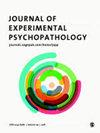对可卡因的渴望会调节可卡因的使用吗?以记忆为中心的认知疗法的随机对照试验分析
IF 1.9
4区 医学
Q4 PSYCHIATRY
引用次数: 1
摘要
可卡因使用障碍(CUD)是一种使人衰弱的精神病理,没有推荐的药物治疗或特定的心理干预。记忆聚焦认知疗法(MFCT)是一种治疗CUD的新型心理疗法,其理论基础是修改和重新巩固与可卡因渴望相关的记忆,以实现认知和行为控制。一项试点随机对照试验表明,这种疗法与减少渴望和可卡因使用有关。采用80%的置信区间(CI)进行零假设检验,我们进行了探索性因果中介分析,并进行了混杂校正,以确定MFCT后可卡因戒断是否由减少的渴望体验和增加的情绪调节介导。情绪调节困难量表的参与者数据不符合筛选评估作为潜在的中介。可卡因渴望(通过渴望经历问卷的频率版本评估)与MFCT对可卡因戒断的总治疗效果相关(1.499;80% CI 1.114 - 1.970;P = .012)。一个显著的自然间接效应表明,可卡因使用的减少是由渴望体验频率的降低强烈介导的(1.753;80%置信区间:1.334 - 2.936;P < 0.0001)。本研究为支持MFCT的理论作用提供了探索性证据,并强调了渴望作为治疗靶点的重要性。本文章由计算机程序翻译,如有差异,请以英文原文为准。
Does craving for cocaine mediate cocaine use? Analysis of a randomized controlled pilot trial of memory-focused cognitive therapy
Cocaine use disorder (CUD) is a debilitating psychopathology, with no recommended medication therapy or specific psychological intervention. Memory-focused cognitive therapy (MFCT) is a novel psychotherapy for CUD, theorized to modify and reconsolidate cocaine craving-related memories for cognitive and behavioral control. A pilot randomized controlled trial indicated that this therapy is associated with reduced craving and cocaine use. With an 80% confidence interval (CI) set for null hypothesis testing, we conducted an exploratory causal mediation analysis with confounder adjustment to determine whether increased cocaine abstinence following MFCT is mediated by reduced craving experience and increased emotion regulation. Participant data on the Difficulties in Emotion Regulation Scale did not meet screening evaluation as a potential mediator. Cocaine craving (assessed by the frequency version of the Craving Experiences Questionnaire) was associated with a total treatment effect of MFCT on cocaine abstinence at follow-up (1.499; 80% CI 1.114 to 1.970; p = .012). A significant natural indirect effect indicated that reductions in cocaine use were strongly mediated by reduced frequency of craving experience (1.753; 80% CI: 1.334 to 2.936; p < .0001). This study provides exploratory evidence in support of the theoretical action for MFCT and underscores the importance of craving as a therapeutic target.
求助全文
通过发布文献求助,成功后即可免费获取论文全文。
去求助
来源期刊

Journal of Experimental Psychopathology
Medicine-Psychiatry and Mental Health
CiteScore
2.00
自引率
0.00%
发文量
19
审稿时长
11 weeks
期刊介绍:
The Journal of Experimental Psychopathology (EPP) is an open access, peer reviewed, journal focused on publishing cutting-edge original contributions to scientific knowledge in the general area of psychopathology. Although there will be an emphasis on publishing research which has adopted an experimental approach to describing and understanding psychopathology, the journal will also welcome submissions that make significant contributions to knowledge using other empirical methods such as correlational designs, meta-analyses, epidemiological and prospective approaches, and single-case experiments.
 求助内容:
求助内容: 应助结果提醒方式:
应助结果提醒方式:


